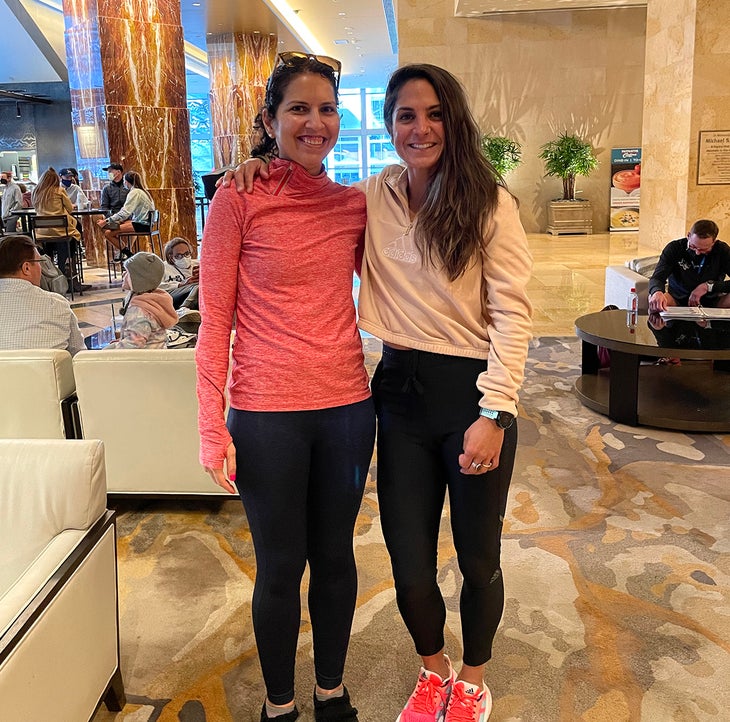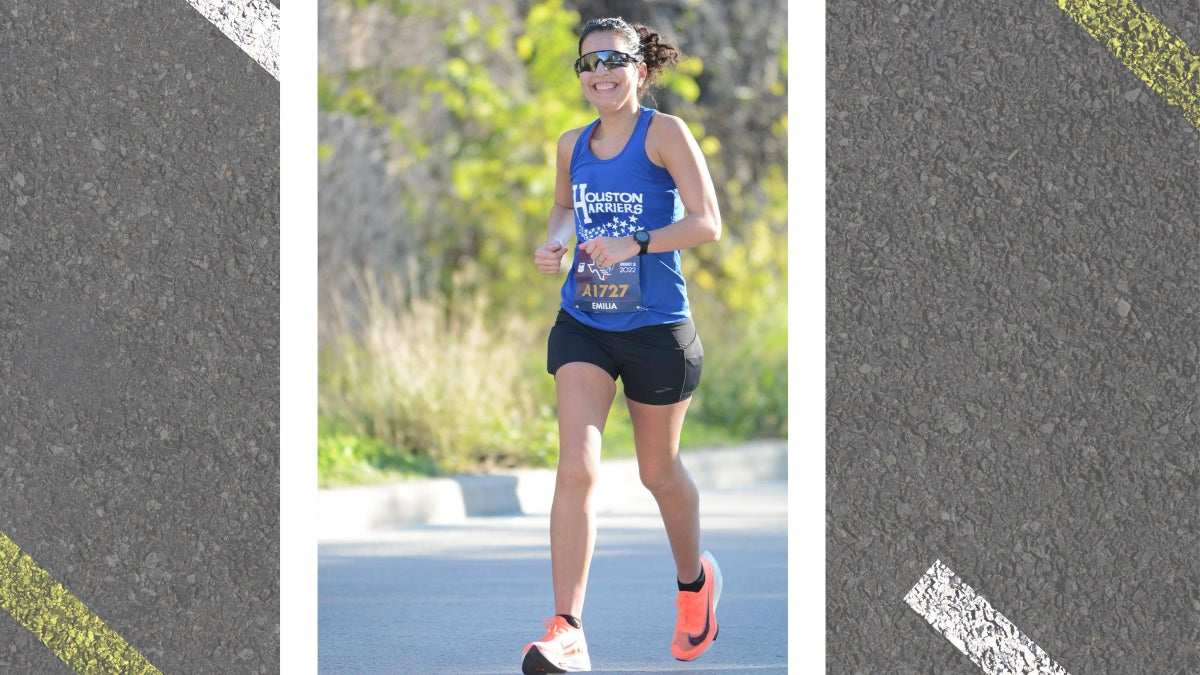Products You May Like
Get access to everything we publish when you
sign up for Outside+.
This past weekend, I ran the Houston Marathon, my 11th marathon overall, in 3:30:14, which was a 15-plus minute personal best and a Boston Marathon qualifier by almost five minutes. (I turn 35 next month and need at least a 3:35 to qualify for my new age group for the 2023 race.) Although I’d had the goal to qualify for Boston ever since I ran my first marathon in 2010 at age 23, this was the first time I felt truly fit and confident enough to actually go for it.
The COVID-19 pandemic threw a lot of people’s training and motivation levels for a loop, my own included. To add an extra layer to the mix, my last marathon (and previous PR) was the 2019 Houston Marathon, and after getting in shape to first attempt a Boston qualifier at the 2020 race, I got injured a month out and ultimately had to sit it out.
On one hand, the race cancellations that the pandemic brought shortly thereafter were a blessing in disguise, because they kept me from jumping back into training too quickly and digging myself into a deeper injury hole. On the other hand, coming back so slowly did a number on my mental game as I struggled to do any distance intervals at the pace I’d been prepared to run for 26.2 miles.
This was where hiring a coach came in. I’d been following professional runner Nell Rojas’s career for several years before interviewing her for a couple of articles I wrote in 2020. I was intrigued by the fact that Rojas, who placed ninth at the 2020 Olympic Marathon Trials and was the top American and sixth woman at the 2021 Boston Marathon, trains at a lower volume of mileage than most of her competitors. I was also interested in diving deeper into her philosophy that not every runner necessarily benefits from high-mileage training, even when pursuing goals like a Boston or Olympic Trials qualifier.
I’d been running marathons for 10 years at that point and my own trial and error had shown me that I, too, am someone who performs better on lower volume, having run my best marathon times in cycles where I peaked at 45–50 miles in a week, compared to the ones where I experimented with 60-plus miles and ran some of the worst races of my life.
I let Rojas know I was interested in hiring her as a coach once it looked like races were actually happening again and I had a goal race on the calendar. We stayed in touch and once I registered for the 2022 Houston Marathon, and we planned to start working together five months out, beginning in mid-August of last year. Here are some of the biggest takeaways from this first (and definitely not last) training cycle together.
RELATED: Nell Rojas Announces Her Adidas Sponsorship and Starts Off on a Very Generous Foot
Your Coach Should Understand Your Life Circumstances and Align With Your Values

The biggest reason I was intrigued by the possibility of working with Rojas was when she told me, in an interview, that she believed most people are not suited to run high mileage simply because they’re not elite athletes themselves—most recreational runners are people with full-time jobs who likely aren’t sleeping enough, much less doing things like taking naps or getting regular massages. Seeing as how Rojas balances her own career as a professional athlete with coaching runners both virtually and in-person in her hometown of Boulder, Colorado, there was no question that she’d get it if I needed to adjust the schedule if something ever came up.
“As a coach looking at an athlete and being able to see how they prepare for and react to different workouts, outside stressors, and race situations day in and day out, I can sometimes more clearly see what they’re capable of than they can,” Rojas says.
It was also a plus that we’re the same age, which made Rojas really easy to talk to as a peer, both about running and life in general. And lastly, on top of having someone who checked all the boxes of what a coach would offer to make the investment worthwhile, because of the many conversations I’ve had preaching the need for better representation in all aspects of the running industry, it was also important to me to hire a coach who was a fellow woman of color.
A Coach’s Guidance Can Make All the Difference in Avoiding Injury
Shortly before I’d hired Rojas to train me for Houston, I received an invitational entry to run the 2021 New York City Marathon. The plan was to run it more for fun while still keeping Houston as the main goal, but a hip strain I sustained at the beginning of the year started to flare up once my long runs got longer and we started adding in the hill training I’d need to still run a strong race in New York.
Together, Rojas and I came to the decision that if Houston was my A-goal, and if I wanted to give myself the best chance of success there, the wisest decision would be to defer my New York entry to next year and back off the training for a bit, rather than ramping up the mileage and intensity and likely straining my hip even more.
This was where having Rojas in my corner made a huge difference. At 16 weeks out, I still had plenty of time before Houston, so taking a couple of weeks off from running wasn’t a big deal. But on top of that, per the recommendation of my sports chiropractor, Rojas also had me introduce cross-training into my routine, leaving it in all the way to the end of the cycle. She also didn’t have me do any speed work for a full month after that conversation.
Without Rojas’ guidance, I surely would have jumped back into hard sessions a lot sooner than that, possibly sabotaging my marathon altogether. I also would’ve shunned cross-training simply because I don’t enjoy it as much as running. Plenty of runners are not smart about injury recovery, and Rojas helped me see that proper rest and rehab wouldn’t make me lose fitness, which was proven by the fact that I ran a half marathon at marathon goal pace just a couple of weeks after that scaled-back month.
The Right Coach Will Help You Avoid Losing Sight of Your “Why”…
Like many runners, I’m someone who’s struggled with burnout in the past, often self-sabotaging my race goals as a result of getting too in my head, taking myself too seriously, and not giving my body and mind a break when I truly needed it. While I do still take my end goals seriously (I wouldn’t be paying a coach to train me if I didn’t), at the end of the day, running marathons is truly a hobby and something we do for enjoyment when it comes to recreational runners at my level. No one else is ever going to care as much or be as disappointed as I may be if I miss a goal, so if I’m ultimately the only one who cares, I may as well be enjoying the journey. Rojas emphasized that as well and always sent a text message the night before each of my races reminding me to have fun above anything else.
RELATED: Burned Out at Work? Research Says Go for A Lunchtime Run
…And Also Help You Hone in on Your Mental Game When It’s Time to Perform
This one was probably the biggest game-changer for me. I didn’t have a single long run that went badly during this cycle and all of my tune-up races went exceptionally well, with me hitting fast splits at the end that were only in my dreams before that. Once we had a month to go before the marathon, Rojas emphasized that the proof was there, I was fit to run a 3:30 marathon and it was all mental from there.
We met in person for the first time the night before the race, as she was in town to race the half marathon in the pro field. I told her this was probably the first time ever that I felt way more excited than nervous about running the marathon, which we both agreed was a really good sign.
Later that night, she texted me her usual “have fun,” also adding “You can run 8-minute pace [a.k.a. marathon goal pace] all damn day.”
I took both of those messages to heart on race day, running just about the whole time with a smile on my face. I repeated, “You can run 8-minute pace all damn day” to myself hundreds of times, especially when it started to feel harder in the last 5K. I ended up with a 2-minute negative split, a second half of mile splits all under 8 minutes, and a whole lot of happy tears at the finish line.
“It’s easy for me to believe in an athlete because their training, along with their attitude, indicates a certain performance, and it’s easy for me to remind them that it will be hard and to be ready and excited for that moment when you’ll have to decide to push through or give up,” Rojas says. “It’s up to the athlete, like Emilia, to believe in themselves, which is all that really matters.”
Suffice it to say, I’d say hiring a running coach has proven to be well worth the investment.
RELATED: Should You Hire a Running Coach?
